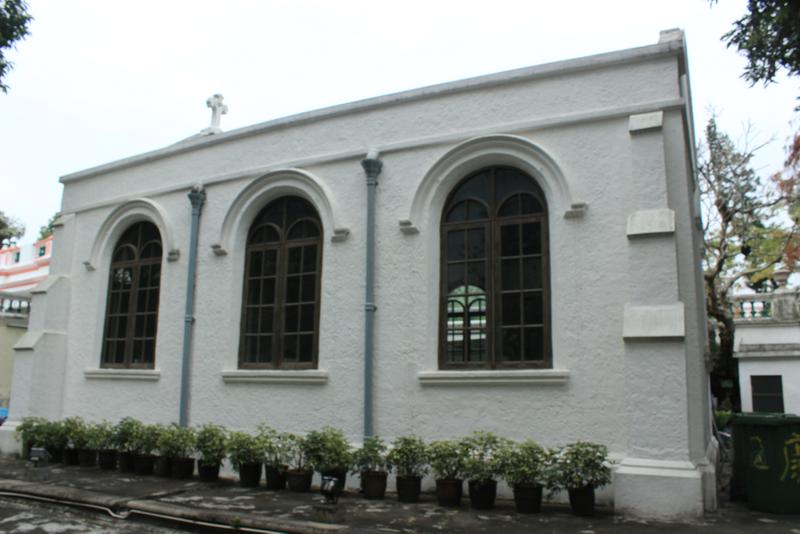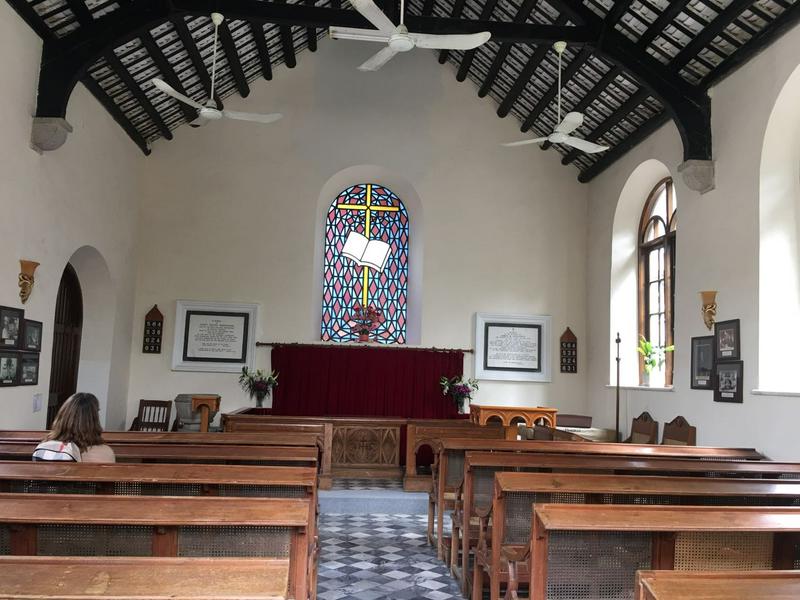Christianity in Macau has a long history. Macau was the first point in China to which the Gospel came, brought by Jesuit missionaries in 1552, as the Portuguese came to establish a foothold in China. The Catholic Church in Macau was not interested in a mission to the local population but focused on China and Japan. Only Portuguese-speaking priests were allowed to minister in Macau. Chinese-speaking ones were sent to the mainland.
Early on, several large Catholic cathedrals were built in Macau as well as the Jesuit College of St. Paul, which was the first Western college in the Far East. St. Paul's Cathedral, at the time it was built in the early 1600s, was the largest Catholic church building in Asia. After a fire swept through the church in 1835, all that remained standing was the stone front which is still standing today and is known as the ruins of St. Paul's. There are several other large Catholic cathedrals that were built during the 1600 and 1700's. Having these large structures alongside Buddhist and Confucius temples highlight the "East meets West" culture in Macau.
While Macau was a Portuguese colony, the Catholic Church had significant influence in the government and Catholic Church leaders were given much decision-making power, especially as intermediaries in helping locals deal with the Portuguese administrative bureaucracy. Socially, the Catholic Church was in charge of much of the social welfare and education work that went on in the city. Today, the Catholic church continues to manage and maintain many schools, daycare centers, elderly homes, and social programs. There is also a Portuguese Catholic University in Macau.
Although Catholicism was brought to Macau by the Portuguese more than 450 years ago, it makes up only about 5 to 15 per cent of Macau's population, depending upon which sources one refers to. Many within the Catholic community belong to the Macanese subgroup, which are the offspring of Portuguese and Chinese intermarriages. There is also a large Philippino community in Macau working as domestic helpers, security guards, and in the restaurant and hotel industries. The majority of them attend the Catholic Church and would be considered part of the Catholic community.
The Protestant Church in Macau has a shorter, 200-year history, beginning in 1807 with the coming of Robert Morrison, the first Protestant missionary to China. He arrived from England and worked as a translator for the British East India Company. He was the first Protestant to translate the Bible into Chinese. Nine years after his arrival in Macau, Morrison baptized his first convert, Choi Gou. He baptized only ten local Chinese during his 27 years in Macau. Morrison, along with his wife and an infant son, was buried at the Macau Old Protestant Cemetary that is adjacent to the small Anglican chapel that bears his name. Morrison Chapel itself has a history of about 200 years, even though the present chapel was built in 1922. At present, it still regularly holds a Sunday morning church service.
Following the Treaty of Nanking in 1842, which finalized the first opium war between China and Great Britain, Hong Kong was given to the British as a colony and soon eclipsed Macau in importance. Missionaries in Macau soon began moving to Hong Kong where evangelistic work was easier and more plentiful. It was not until after 1900 that the Protestant church began again. The Baptists arrived in Macau in 1904. The Macau Baptist Church has a history of over 100 years and today is one of the larger churches in Macau, by church attendance.
In 1906, the Church of Christ in China church was started in Macau. Today, the Chi Tou Church is also one of the larger churches in Macau, for many years having run a Christian kindergarten and elementary school.
The first Anglican Church in Macau was founded in 1940 and the church also focused on education. Choi Gou Anglican School is named after Robert Morrison's first convert. The Presbyterians started a ministry to fisherman in 1949 and the Canadian Assembly of God mission established work in 1954. Although today there over 70 churches in Macau from many different denominations, most of them have less than 50 members. Only several, including the Macau Baptist Church, the Chi Tou Church of Christ in China, the Macau Pak Kap Chow Baptist Church, the 611 Ling Liang Church and the Anglican Church have over 100 members. One church that has been rather successful in its growth in members is the Xuan Tou Church, a local denomination started in the 1970's by a local Chinese pastor. Today it has more members than all of the other Protestant churches in Macau combined.
Although Protestants have been in Macau for over 200 years, the total population of Protestant Christians is less than 5,000 which is less than 1% of Macau's population. According to this percentage, Macau has the lowest number of Protestant Christians in the Chinese world, including China. Because Macau is a gambling city with over 40 casinos, it has also attracted many other unhealthy elements to the city including prostitution. It is shocking to note that there are more prostitutes in Macau than Protestant Christians.
Because of the small number of Christians in Macau, the many unhealthy elements in society related to the gambling industry, the high number of local Chinese who work in casinos where their working hours are constantly changing, and the high density living (Macau has the highest population density of any country on earth), it is very challenging for churches to do ministry. Macau was not affected by the Cultural Revolution in mainland China and so people were able to continue their traditional forms of Buddhism and ancestor worship. In Macau, Christianity is still seen as a western religion. Family members are often working at different times in different places and so it is difficult to come together. Relationships are often strained and there is the continued pressure to make enough money to make ends meet, given that the salaries in Macau have not kept up with the cost of living, especially the cost for housing.
Therefore attendance at church or making time for one's Christian faith is often a lower priority. Churches often say that it is easy to share the Gospel with someone and even invite them to come to church, but difficult to have them make a committment to follow Christ and regularly come to church. Because of the low number of Christians in Macau, it is difficult for believers to find other Christians in their places of work or school. As a result, many Christian do not find the encouragement they need when things get difficult and discipleship is a long and slow process. Pastors have said that, on average, it takes 7 years to disciple a local Christian to the point where they are spiritually healthy and mature.
Along with the many small churches, there are also a myriad of Christian para-church organizations in Macau involved in many different kinds of ministries such as prison visitation, hospital chaplaincy, children's ministry, Bible distribution to tourists, ministry to prostitues, and Christian drug and gambling addiction rehab ministry.
The churches also see training leaders as important. Several of the larger churches have in-house training programs where they train their own in theology, evangelism, preaching, leading small groups, and pastoral care. Macau Bible Institute (MBI) is an inter-denominational training institute that is also involved in leadership training as well as lay training. Until recently, courses were taught in Chinese. However in order to provide training for a wider audience, including the many Philppinos who work in Macau, evening courses and courses taught in English are now offered.
Although the Catholics do have some locally produced Christian materials for teaching and training, almost all of the Protestant materials are produced in Hong Kong, Taiwan or further afield. Many Hong Kong churches are also involved in sending short-term ministry teams of young people to Macau for a weekend or longer to help in ministry together with Macau believers and churches.
Macau has many Philippinos working in the tourist and services industries. Unlike Hong Kong, where female Philippino maids must live with their employers, Macau allows both men and women to work as well as live away from their employers. This has meant that entire Philippino families can live in Macau. Philippino churches account for more than 10% of the total number of Protestant churches in Macau.













